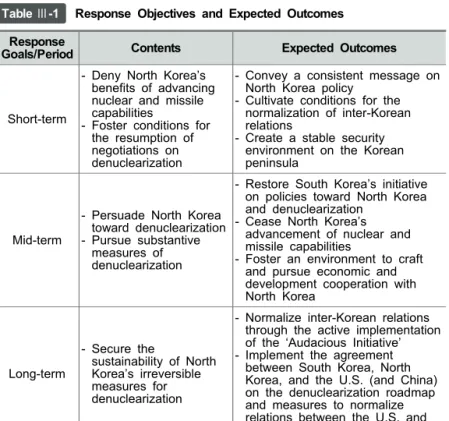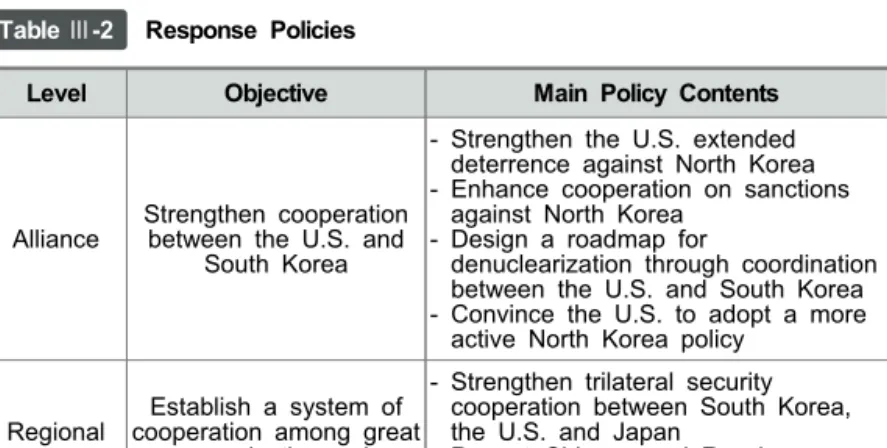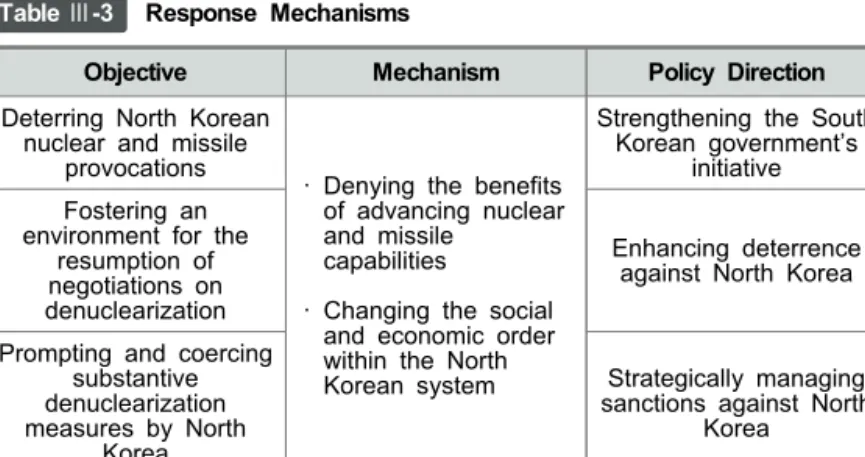This English translation is an abridged and edited version of the KINU Research Paper, The Challenges of North Korea's Nuclear Program and International Cooperation, by Sung-Yoon Chung et al. The analysis, comments and opinions presented in this document are those of the authors and do not necessarily represent the views of the Korea Institute for National Unification. The main purpose of this study is to identify the challenges of the North Korean nuclear problem and to propose possible responses.
Moreover, the nature of the problem is likely to change and the implications of such change are expected to be substantial. Given the seriousness of the current situation and the need for further research, this study aims to present indicators that the new administration of Yoon Suk Yeol, inaugurated in May 2022, can use to assess the strategic environment from the early stages of the mandate of the administration and propose policy recommendations accordingly. Respondents to the expert opinion poll included academics specializing in the field as well as former high-ranking officials who have worked on the North Korean nuclear issue.
The fundamental objective of the expert opinion survey was to identify the main challenges of the North Korean nuclear problem that the South Korean government is likely to face by 2023. For each of these categories, the causes, content and consequences of the identified challenges are explored. .
The Current State of the North Korean Nuclear Problem and
The biggest challenges facing the Yoon administration early in its tenure are North Korea's provocations and its advances in nuclear and missile capabilities. North Korea resumed its testing of intercontinental ballistic missiles (ICBMs) on March 24, 2022, not long after the inauguration of the Yoon administration. This was North Korea's first test in 4.5 years following the test launch of the Hwasong-15 missile on November 29, 2017.
In addition to advancing its nuclear and missile capabilities, North Korea has also codified its nuclear doctrine. North Korea's capabilities and strategy, America's North Korea policy and US-China relations, and the consequences of geopolitical crises. First of all, the most important factors are North Korea's nuclear and missile capabilities and its nuclear strategy.
The degree to which the environment for North Korea's denuclearization would deteriorate is related to North Korea's advancement in its nuclear and missile capabilities. 10 Challenges of North Korea's Nuclear Program and International Cooperation .. concessions commensurate with its enhanced nuclear and missile capabilities. This is because of the clear fact that the target of North Korea's tactical nuclear weapons will be South Korea and the areas adjacent to the Korean peninsula.
Second, the other set of important strategic factors that the Yoon administration may need to address are US North Korea policy and US-China relations. North Korea's recent consecutive ICBM provocations are likely to be carried out given this dynamic. However, the war in Ukraine will exacerbate the North Korean nuclear problem if the war causes North Korea to fall into the delusion that defeating the US.
In particular, given North Korea's rapid progress in its nuclear and missile capabilities and high degree of determination, the North Korean nuclear issue is expected to remain extremely fluid through the second half of 2024, the remaining terms of President Yoon and President Biden. In other words, as North Korea appears to be entering the final stages of advancing its nuclear capabilities and deployment, the Yoon administration must do everything in its power to tackle the North Korean nuclear problem from the ground up. In addition, the South Korean government must also actively and boldly influence the calculus of the North Korean leadership, so that North Korea will be forced to reconsider its strategic assessments of the possession and abandonment of nuclear capabilities.
Challenges to the North
Korean Nuclear Problem and International Cooperation
Second, experts generally believed that there is a need for an active policy of denuclearization of North Korea by the United States, but believe that China's influence on North Korea is not very strong. Finally, experts agreed that US-China cooperation is essential to solving the North Korean nuclear issue, and that there is a need to primarily consider partial disarmament of North Korea's nuclear arsenal before complete denuclearization. Based on a thorough analysis and assessment of the results of the expert survey, this study identifies the following eight challenges that the South Korean government will face in the latter half of 2023; ① North Korea's repeated high-intensity provocations, including nuclear tests, ② The Biden administration's return to "strategic patience" for its North Korea policy, ③ highlighted areas of cooperation between the US and South Korea on the North Korean nuclear issue, ④ increasing.
18 Challenges of North Korea's nuclear program and international cooperation. the negative effects of US-China strategic competition, ⑤ increasing North Korea's economic dependence on China, ⑥ consolidation of the dynamics of confrontation between South Korea, the USA and Japan on the one hand and North Korea, China and Russia on the other another, ⑦ the drastic emergence of emerging global security issues involving areas such as health, energy, food, cyber and human security, and ⑧ changes in the international order and global norms. North Korea's increasing provocations, as well as the Biden administration's passive policy toward North Korea, suggest that an environment conducive to denuclearization negotiations will be difficult to foster for the foreseeable future. Despite the differences that exist in the details of each of the different levels of challenges, the ultimate goal of the response system that this study proposes is to "actively deter the threat of North Korea's nuclear weapons and foster a strategic environment for denuclearization negotiations ". .'.
There is a wide range of policies and strategies to achieve the denuclearization of North Korea. With this in mind, the key policies for international cooperation to achieve the denuclearization of North Korea are as follows: Dramatic strengthening of the U.S. Currently, North Korea is extremely persistent in possessing nuclear weapons and advancing its nuclear capabilities.
North Korea is unlikely to voluntarily change such preferences in the short term. For example, if South Korea and the US-ROK alliance respond to North Korea's diversified missile capabilities by establishing a missile defense system, the benefits North Korea seeks to achieve by advancing its capabilities will be immediately negated. As such, establishing mechanisms that 'deny' the benefits North Korea seeks through nuclear and missile provocations can be an effective means of deterring North Korean provocations.
However, this alone is not a sufficient condition that guarantees the determination and execution of North Korea's denuclearization. The two sets of recommendations each related to these two aspects are expected to increase North Korea's sensitivity and vulnerability regarding strategic choices about nuclear capabilities. In this regard, there is a need to consider efforts to address North Korea's energy supply problem as a possible reward for denuclearization measures by creating a mechanism for cooperation on natural gas.

Conclusion
This study highlighted the response to the North Korean nuclear issue as the top priority facing the new Yoon administration established in 2022. This is because the situation regarding the North Korean issue is expected to worsen due to various factors, as well as because the consequences will worsen the situation will probably be alarming. This study expected the North Korea problem to worsen mainly due to the following four reasons: 1) North Korea's own strategic decisions, 2) North Korea's assessment of the regional and global environment and how it seeks to take advantage of such conditions, 3) North Korea's need for the strengthening of nuclear coercion directed at South Korea and the United States, and 4) the domestic political needs of North Korea.
This study further argues that the diplomatic and security environment in both the Korean peninsula and Northeast Asia will deteriorate significantly if North Korea continues to engage in nuclear and missile provocations to pursue these goals. This is because not only are nuclear, ICBM, and SLBM provocations technologically and strategically necessary for North Korea, but also because they are likely to harm the vital national interests of major powers in the region. The results of the expert opinion poll conducted by this study suggest that unlike in the past, the challenges South Korea will face regarding the North Korean nuclear issue will be very different.
In other words, the South Korean government is likely to face a very difficult policy environment in which it must consider responding to direct provocations by North Korea, pursue the disarmament of North Korea, and prepare for both indirect and direct consequences of North Korea's nuclear weapons. . Put another way, the North Korean nuclear problem has become a regional and global security issue that extends beyond the Korean peninsula. Therefore, establishing cooperative relations with the international community has become essential to the process of responding to the North Korean problem.
It has now become almost impossible to expect that the North Korea problem will be resolved without international cooperation. Considering the severity of the situation, this study has identified the challenges facing the North Korean nuclear problem, outlined policy objectives to address this problem, and proposed policy methods and response mechanisms by gathering the opinions of a wide group of experts. Second, a system of trilateral security cooperation between South Korea, the US and Japan should be strengthened to counter North Korea's nuclear coercion and enhance deterrence.
Third, South Korea must actively take the lead in establishing cooperation on issues such as the global energy crisis, cyber threats, and human rights in North Korea through cooperation not only with major powers but also with international organizations.
The Challenges of North Korea’s Nuclear Program and International

